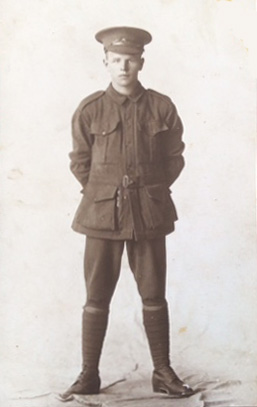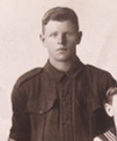Victor Leo Gordon Boyle
From Our Contribution
 Courtesy Helen Manson | |
 | |
| Personal Information | |
|---|---|
| Date of Birth | Not known 1897 |
| Place of Birth | Fitzroy, Victoria |
| Death | 23 Dec 1966, aged 69 |
| Place of Death | Maylands, Western Australia |
| Age at Enlistment | 18 years, 4 months |
| Description | 5' 4¼" (1.63m) tall, weight 126 lbs (57.2 kg); fair complexion, blue eyes, light brown hair. 3rd finger right hand missing. |
| Occupation | brickmaker |
| Religion | Church of England |
| Address | Beenup, Western Australia |
| Next of Kin | Brother, Reginald Boyle |
| Military Information | |
| Reg Number | 4559 |
| Date of Enlistment | 8 Nov 1915 |
| Rank | Private |
| Unit/Formation | 16th Battalion, 14th Reinforcement, transferred to 48th Battalion |
| Date of Embarkation | 12 Feb 1916 - 11 Mar 1916 |
| Ship Embarked On | HMAT A28 Miltiades |
| Date of Return | 3 Mar 1919 - 10 Apr 1919 |
| Ship Returned On | HMAT A14 Euripides |
| Fate |
Missing in Action, later Prisoner of War Returned to Australia |
| Monument | Armadale (Beenup panel) |
| Medals |
British War Medal Victory Medal |
Pre War
War Service
Initially earmarked for artillery reinforcements, on 4 Jan 1916 Victor was transferred to the 14th reinforcement draft for the 16th Battalion, and sailed with them to Egypt.
Arrived in Egypt in Mar 1916, where he was one of those transferred to help form the new 48th Battalion.
Apart from a week in hospital in Dec 1916, he was with his unit until he was captured on 5 Apr 1918.
At 6:55am on 5 Apr 1918, the enemy commenced a very heavy artillery barrage that continued for five hours. At 10:00am the enemy broke through on the battalion's right and it is probable that Victor, already wounded by shell fire, was captured at that time.
Ironically his personal possessions, while being sent home to his family (while he was still officially posted as missing), were lost at sea when HMAT A43 Barunga was torpedoed and sank.
Repatriated to Ripon, England on 12 Jan 1919. Unfortunately his debrief report is not with the rest of his military records. Given a month's leave mid January 1919 he returned to No2 Depot Weymouth before boarding the Euripides. While waiting he went AWOL on three occasions.
On the trip home he spent a couple of days in the ship's hospital with influenza.
Discharged at 5th Military District on 18 Sep 1919.
"...fought through the Dardanelles campaign and went as regimental driver with his battalion to France."[1]
The West Australian 7 Mar 1919 reports Victor's arrival in England ex POW. On 4 Apr 1919 The West Australian reports him as being part of a large contingent of returning troops. He was released from quarantine on the 18th of April 1919.
Post War
PERTH POLICE COURT. (Wednesday.-Before Mr. T. F. Davies, P.M.) Alleged Stealing. - Victor Boyle was charged with having, on May 26, stolen a motor cycle, valued at £49, the property of Herbert Vesper Hitch. Louis Hitch stated that on the night in question he left a motor cycle the property of his brother outside the premises of Messrs. Hatch Bros., 112 Beaufort street. It was identical with the one (produced in Court) which the accused was alleged to have stolen. Herbert Vesper Hitch corroborated the evidence of his brother. Accused had not been authorised to touch the bicycle. P.C. Maingay stated that he saw accused opposite the Beaufort Arms Hotel on Monday evening, at about 8.49pm, endeavouring, but with little success, to run along with the machine in order to make it start. Seeing accused fall over he arrested him. The accused pleaded that he had been wounded in the head in France last August, and was still being treated in the Base Hospital Fremantle, by Dr. Gray. He had no recollection of having been in possession of the motor cycle. After hearing the evidence of Frank Rogers corroborating accused's statements, the Court remanded the accused until the afternoon, when Mr. J. W. Clydesdale appeared for him and stated that Boyle was in a very serious condition, having received a serious wound while a prisoner of war in Germany last year. He had to undergo an operation on Monday next. When under the influence of liquor the accused was not responsible for his actions. Dr. Gray stated that accused was under his care, and his health was in a precarious condition. Accused was bound over to be of good behaviour in two sureties of £10 each and was ordered to pay the costs of damage done to the machine estimated at one pound. [2]
Electoral Roll entries - 1925 - 1936, Byford, a brickmaker; 1949 - 1963 Maylands, brickmaker.
References
- ↑ "The Drill of the Foot-Hills" (PDF) (1917). Western Australia. Mar 1917. p. 14. Retrieved 16 May 2017 – via State Library of Western Australia.
- ↑ "PERTH POLICE COURT.". The West Australian. XXXV, (5,348). Western Australia. 29 May 1919. p. 8. Retrieved 25 May 2017 – via National Library of Australia.